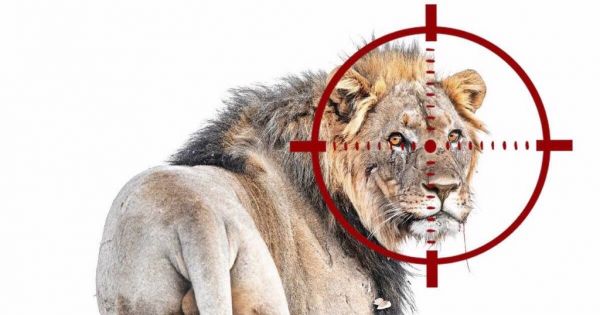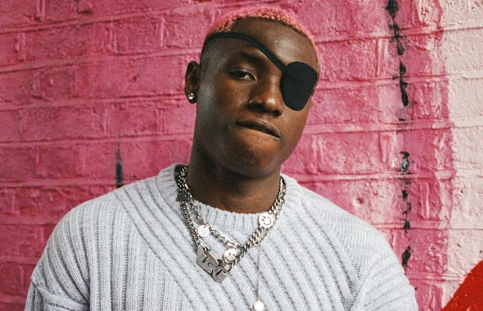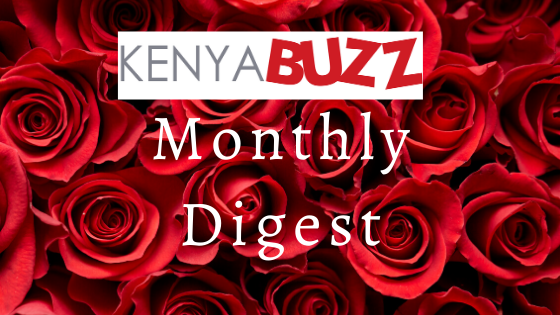After successfully harvesting 10 eggs from the world's last two northern white rhinos,
Najin and
Fatu, on August 22nd in Kenya, the international consortium of scientists and conservationists announces that
7 out of the 10 eggs (4 from Fatu and 3 from Najin) were successfully matured and artificially inseminated.
This was achieved through ICSI (Intra Cytoplasm Sperm Injection) with frozen sperm from two different northern white rhino bulls, Suni and Saut, on Sunday, August 25th. This is the next critical step in hopefully creating viable embryos that can be frozen and then later on transferred to southern white rhino surrogate mothers.
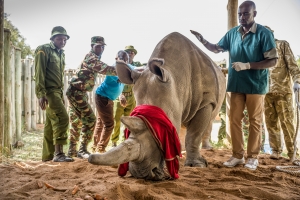
"We were surprised by the high rate of maturation achieved as we do not get such high rate (comparable to what we get with horse oocytes) with southern white rhino females in European zoos. The semen of Saut was very difficult to work with and to find three live sperms needed for the eggs of Najin we had to thaw two batches of semen.
Now the injected oocytes are incubated and we need to wait to see if any viable embryo develop to the stage where it can be cryopreserved for later transfer," said Cesare Galli of Avantea in Cremona (Italy) who led the fertilisation procedure. The international research consortium to save the northern white rhino from extinction is led by Prof. Thomas Hildebrandt from the Leibniz-Institute for Zoo and Wildlife Research (IZW).
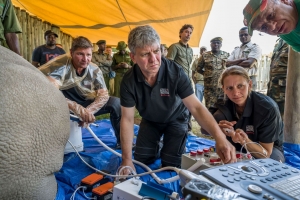
Avantea is responsible for maturing the egg cells and creating viable embryos, further key project partners are Dvůr Králové Zoo, Ol Pejeta Conservancy and the Kenya Wildlife Service.
The results of possible embryo development are to be announced around September 10th. The research program (BioRescue) is funded by the German Federal Ministry of Education and Research (BMBF).
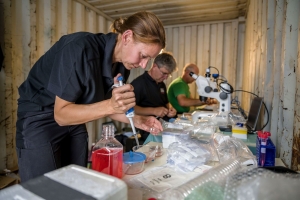
*All pictures by
Ami VitaleCaption Pic 1: Fatu is surrounded by her keepers and Dr. Stephen Ngulu of OlPejeta. She hasreceived the pre-medication and is guided gently onto a soft sand bedding for theprocedure before she receives the top-up medication to be fully anesthetized.
Caption Pic 2: Fatu is undergoing the ovum pick-up procedure performed by Prof.Dr. RobertHermesfrom Leibniz-IZW (left), Prof. Dr. Thomas Hildebrandt from Leibniz-IZW(middle) andDr. Susanne Holtze from Leibniz-IZW (right). Aspiration of eggs fromthe ovaries is a very delicate procedure due to the nearby presence of large bloodvessels
Caption Pic 3: Dr. Susanne Holtze from Leibniz-IZW (left), Prof. Dr. Thomas Hildebrandt fromLeibniz-IZW (middle) and Prof. Cesare Galli (right), are searching for oocytes
| Kenya Wildlife Service is the government institution that conserves and manages wildlife for Kenyans and the world. It also enforces related laws and regulations. www.kws.go.keOl Pejeta Conservancy is the largest black rhino sanctuary in East Africa, and is the only place in Kenya to see chimpanzees. It is also home to the last two northern white rhinos on the planet. Ol Pejeta's cutting edge wildlife security includes a specialised K-9 unit, motion sensor cameras along its solar-powered electric fence, and a dedicated Rhino Protection Unit. www.olpejetaconservancy.orgDvůr Králové Zoo is a safari park in the Czech Republic. It's one of the best rhino breeders outside of Africa and the only place where the northern white rhino bred in human care. Dvůr Králové Zoo coordinates efforts to save the northern white rhinos. safaripark.cz/en/The Leibniz Institute for Zoo & Wildlife Research (IZW) is an internationally renowned German research institute of the Leibniz Association. Its mission is to examine evolutionary adaptations of wildlife to global change and develop new concepts and measures for conservation. To achieve this, the Leibniz-IZW uses its broad interdisciplinary expertise in conducting research for conservation in close dialogue with the public and stakeholders. www.leibniz-izw.deAvantea is a laboratory of advanced technologies for biotechnology research and animal reproduction based in Cremona, Italy. Avantea has over twenty years of experience and the know-how in assisted reproduction of livestock developed through years of research conducted in the biomedical and animal reproduction fields. www.avantea.it/en/The University of Padua in Italy is one of the oldest in the world. Its Department of Comparative Biomedicine and Food Science is developing leading research and education in the field of wildlife conservation and welfare, with a special focus on ethical assessment and evaluation of research projects and educational programs. www.unipd.it/en/university/scientific-and-academic-structures/departments/department-comparative-biomedicine-and |
 "We were surprised by the high rate of maturation achieved as we do not get such high rate (comparable to what we get with horse oocytes) with southern white rhino females in European zoos. The semen of Saut was very difficult to work with and to find three live sperms needed for the eggs of Najin we had to thaw two batches of semen.Now the injected oocytes are incubated and we need to wait to see if any viable embryo develop to the stage where it can be cryopreserved for later transfer," said Cesare Galli of Avantea in Cremona (Italy) who led the fertilisation procedure. The international research consortium to save the northern white rhino from extinction is led by Prof. Thomas Hildebrandt from the Leibniz-Institute for Zoo and Wildlife Research (IZW).
"We were surprised by the high rate of maturation achieved as we do not get such high rate (comparable to what we get with horse oocytes) with southern white rhino females in European zoos. The semen of Saut was very difficult to work with and to find three live sperms needed for the eggs of Najin we had to thaw two batches of semen.Now the injected oocytes are incubated and we need to wait to see if any viable embryo develop to the stage where it can be cryopreserved for later transfer," said Cesare Galli of Avantea in Cremona (Italy) who led the fertilisation procedure. The international research consortium to save the northern white rhino from extinction is led by Prof. Thomas Hildebrandt from the Leibniz-Institute for Zoo and Wildlife Research (IZW). Avantea is responsible for maturing the egg cells and creating viable embryos, further key project partners are Dvůr Králové Zoo, Ol Pejeta Conservancy and the Kenya Wildlife Service.The results of possible embryo development are to be announced around September 10th. The research program (BioRescue) is funded by the German Federal Ministry of Education and Research (BMBF).
Avantea is responsible for maturing the egg cells and creating viable embryos, further key project partners are Dvůr Králové Zoo, Ol Pejeta Conservancy and the Kenya Wildlife Service.The results of possible embryo development are to be announced around September 10th. The research program (BioRescue) is funded by the German Federal Ministry of Education and Research (BMBF). *All pictures by Ami VitaleCaption Pic 1: Fatu is surrounded by her keepers and Dr. Stephen Ngulu of OlPejeta. She hasreceived the pre-medication and is guided gently onto a soft sand bedding for theprocedure before she receives the top-up medication to be fully anesthetized.Caption Pic 2: Fatu is undergoing the ovum pick-up procedure performed by Prof.Dr. RobertHermesfrom Leibniz-IZW (left), Prof. Dr. Thomas Hildebrandt from Leibniz-IZW(middle) andDr. Susanne Holtze from Leibniz-IZW (right). Aspiration of eggs fromthe ovaries is a very delicate procedure due to the nearby presence of large bloodvesselsCaption Pic 3: Dr. Susanne Holtze from Leibniz-IZW (left), Prof. Dr. Thomas Hildebrandt fromLeibniz-IZW (middle) and Prof. Cesare Galli (right), are searching for oocytes
*All pictures by Ami VitaleCaption Pic 1: Fatu is surrounded by her keepers and Dr. Stephen Ngulu of OlPejeta. She hasreceived the pre-medication and is guided gently onto a soft sand bedding for theprocedure before she receives the top-up medication to be fully anesthetized.Caption Pic 2: Fatu is undergoing the ovum pick-up procedure performed by Prof.Dr. RobertHermesfrom Leibniz-IZW (left), Prof. Dr. Thomas Hildebrandt from Leibniz-IZW(middle) andDr. Susanne Holtze from Leibniz-IZW (right). Aspiration of eggs fromthe ovaries is a very delicate procedure due to the nearby presence of large bloodvesselsCaption Pic 3: Dr. Susanne Holtze from Leibniz-IZW (left), Prof. Dr. Thomas Hildebrandt fromLeibniz-IZW (middle) and Prof. Cesare Galli (right), are searching for oocytes

